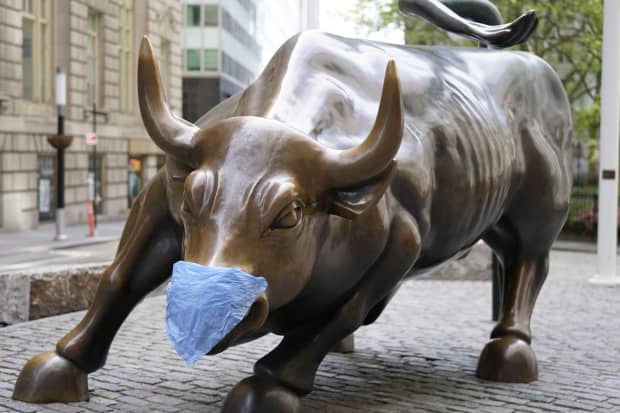This post was originally published on this site

Agence France-Presse/Getty Images
The U.S. economy and stock prices have been hit by a triple whammy. A pandemic that shut down offices and businesses, squabbling between the White House and Democrats about extending stimulus spending beyond last summer, and an unusual amount of election-year drama.
The shutdowns required by COVID-19 pushed down gross domestic product by 31% on an annualized basis in the second quarter. The economy substantially, but not completely, rebounded in the third quarter, thanks to a huge stimulus spending and credit support from the Federal Reserve.
Rapid recovery
After rising about 4.4% from the end of 2019, the S&P 500 index SPX, -0.02% dropped 34% from February to March. Supported by Fed asset purchases and loans, equities recovered by August. In this digital age, bear markets and recoveries happen at the pace of computer games, not cricket matches.
Individual stock investors didn’t panic. Most stayed the course and avoided the temptation to try to time the market. Especially those invested in broad index funds and ETFs, while keeping an emergency reserve in cash and fixed-income securities.
Corporate profits took a hit but investors appeared focused on the recovery and the spending boost a Biden administration could bring.
Senate will constrain Biden
With an Biden presidency and a Republican Senate, investors appear sanguine that the worst of Biden’s tax and spending proposals won’t happen. Except for the very wealthy, we are likely facing personal and capital-gains tax rates in line with the Obama era, and corporate taxes raised to 28%—not the 35% that prevailed before President Trump.
As for taxing capital gains at death and significantly higher estate taxes, the debate about fairness will shift to the impacts of those ideas on family farms and businesses. The Democrats enjoy substantial support among college-educated voters, who are stock investors, minority business owners who could be affected by higher estate taxes and in the high-tech and financial sectors. Liberal Democrats pushing for a punitive combination of capital gains and estate taxes should face pushback from more moderate Democrats representing these constituencies.
Biden may not be able to satisfy the Black Lives Matters movement but he should be able to move mayors in Democratic cities to better support police, curb urban violence, and reopen cities as vaccine use spreads. National healing may be slow, but the world will look brighter next spring than it did the six months before the election.
The economy will take several years to fully heal but while this is a sad note for inequality, the business failures are disproportionately concentrated among small businesses. In the corporate sector, losses in bricks-and-mortar retailing, hospitality and movie theaters are mirrored by broader opportunities in other industries.
Profits set to soar
Corporate profits are expected to rise 44% year-over-year in the second quarter, according to FactSet.
Currently, the S&P 500 is selling for 35 times earnings. That is well above the 25-year moving average of 26 and implies an equivalent interest rate of only about 2.8%.
However, the 10-year Treasury TMUBMUSD10Y, 0.810% is yielding is less than 0.8%. That’s well below the historical average and the Federal Reserve is committed to keeping interest rates low. As stocks compete with bonds, this implies a sustainable price-earnings ratio consistently closer to 30 or 35.
Gold GOLD, -1.53% has done exceptionally well this year, but historically its price has been more volatile than stocks. Once all the drama of election-year politics passes and vaccines are approved for distribution, don’t look for more big gains there.
Overinvesting in real estate is a poor solution too. Over the past 25 years, the average return on residential real estate in the 10-largest metro areas was 4.5%. Including dividends, it was 11.8% for the S&P 500.
Forecasters are looking for the economy to gradually heal in 2021 and 2022 and for corporate earnings to recover.
A 44% jump in corporate earnings for the second quarter would imply a price-earnings ratio for the S&P 500 of 23 at current prices.
The bottom line: stocks will be undervalued once we have at least one vaccine and the recovery goes into its next phase
Investors should look beyond the turmoil of the next few months and stick with stocks.
Peter Morici is an economist and emeritus business professor at the University of Maryland, and a national columnist.
More from Peter Morici:
Stagflation will challenge the president in 2021
U.S. trade policy with China needs a reset, but neither Trump nor Biden have good plans
Squabbling politicians lose sight of the urgency of getting America back to work

